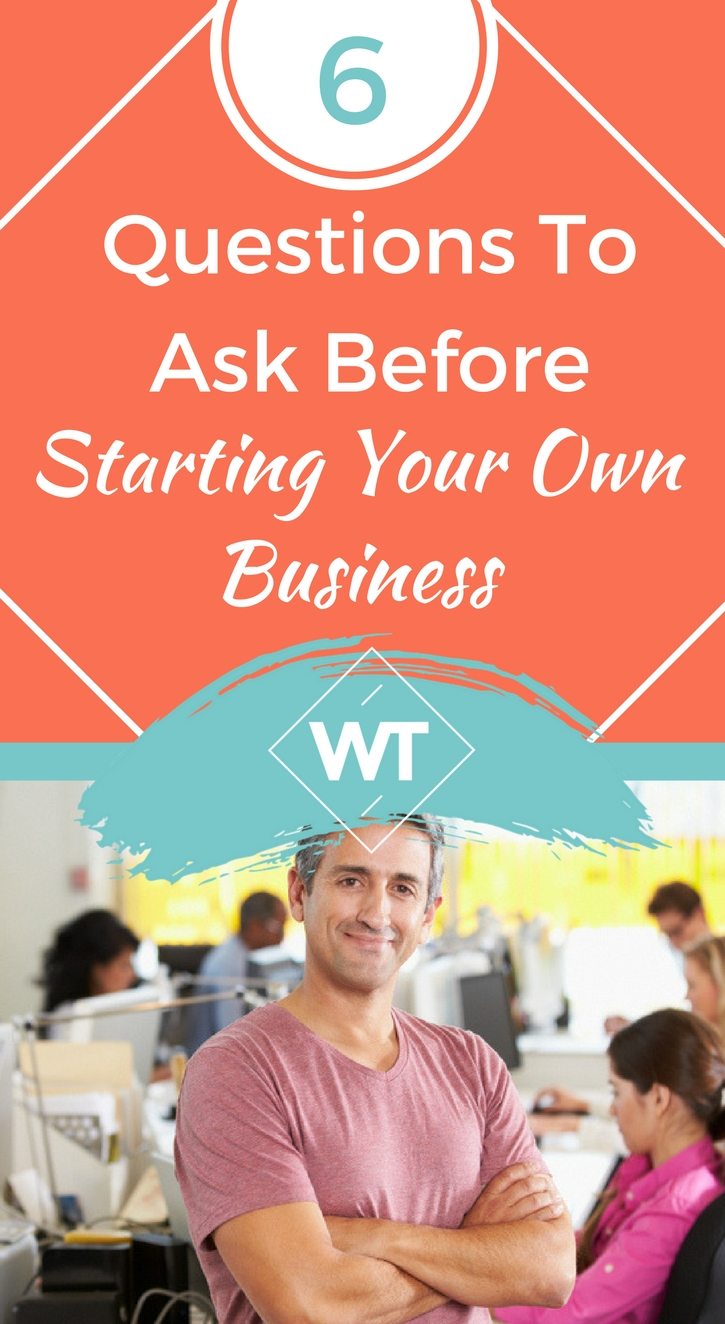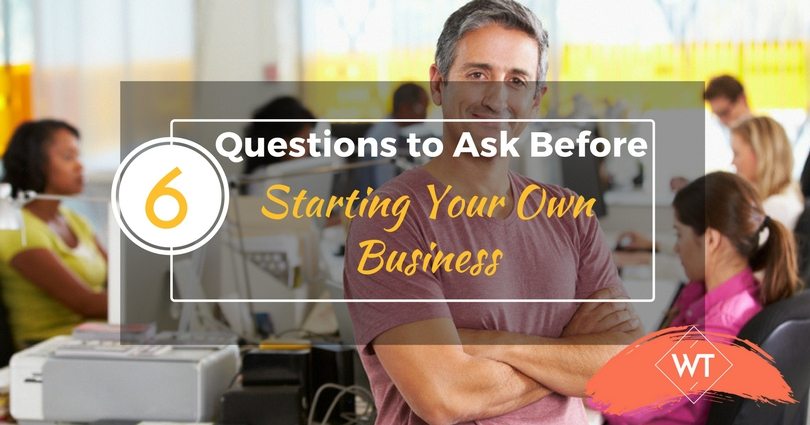6 Questions to Ask Before Starting Your Own Business

Before starting your own business, it’s important to focus on all aspects of your potential business. If you’ve been a full-time employee for years, it can be a tough transition. Being a self-employed business owner requires a lot of time, energy, and money. Before you make the leap to business ownership, ask yourself the following questions.
Questions to Ask Yourself Before Starting Your Own Business
Before you take the plunge, you need to be realistic about your future goals. How are your finances? What are your intentions? Why would you like to start a business? There’s so many areas to address. When you ask yourself vital questions, you can see what your strengths and weaknesses are.
Don’t be afraid to write down your answers to the following questions. From your personal answers, you’ll see where improvements need to be made. This can help you take proactive measures towards your goals. Write out the following questions and answer them. This will give you a better understanding of where you currently stand.
1. Why Am I Doing This?
This is the first and most important question to ask yourself. There are many reasons why people start their own business. Perhaps you LOVE your current work, you just dislike the company. You have developed ideas of your own, and you’re ready to take the next step.
Maybe you have invented a product that you’d like to share; you’re expanding previous freelance work; or you would like to work from home in order to raise your children. There are many possible answers to this question. It’s important that you understand what drives and motivates you regarding your potential business endeavour.
2. Do I have what it takes?
When you think about your skill-set, your current situation, and your personal characteristics; do you truly believe you have what it takes? You have to believe in yourself . Do you have the money, the time, the energy, the skills, the knowledge, and the people to make your business a success?
No one is perfect, so it’s okay to have areas of weakness. Write down the areas that are less than perfect. Now, think of ways you can improve those areas. If you’re not willing to address these areas before you begin your business, you will struggle to reach your goals.
3. How will my potential business affect my personal finances?
Before starting your own business, it’s easier if you have a spouse who helps support your personal financial situation. Other business owners dip into their savings or apply for a loan. Regardless of how you access money to start-up your business, you will need to make sure your personal finances are stable.
Make a list of what you currently owe: car payments, mortgage, credit cards, line of credit, etc. Are these areas manageable? Have you created a payment solution that allows you to stay on track? Starting a business will require some funding, so make sure you’re financially stable before embarking on this journey. If you’re starting a business to get out of your personal debt, then you are starting a business for the wrong reasons.
4. How do I handle setbacks and failure?
Although there will more and likely be many positive moments, you will experience some negative situations as well. It’s important that you focus on how you react to setbacks. Are you able to accept failure, make changes, then push forward? This is very important when you own a business.
How easily do you get discouraged? It’s essential that you’re honest with yourself. Are you the type of person that can take a disappointing situation and use it as a learning experience? Can you stay committed, even when you’re let down? Owning a business is best for individuals that do not give up once they experience a setback.
5. What are my personal strengths? What sets me apart?
Owning a business means that you’ll need to deal with direct competition. This is where your strengths come into play. You may be a motivated person, but so are other business owners. How can you separate yourself from your competitors? What do you have that they don’t? These differences can give you an upper edge.
Walt Disney said, “I have been up against tough competition all my life. I wouldn’t know how to get along without it.” Let your strengths increase your competitive nature. If you’re always striving for more, you will stay ahead of your competition. Look at Starbucks for instance. They were not the first company to offer coffee, yet they set themselves apart.
6. How solid is my business plan?
A business plan doesn’t need to be air-tight. In fact, it will change with the market. You’ll need to adapt throughout time, changing your business plan as new ideas and opportunities present themselves. However, a solid business plan will help you reach your goals more effectively.
Not only will a business plan help you organize your ideas and plan for the future, but it’s essential for funding purposes. If you’re looking to get a loan for instance, you will need a formal business plan. An effective business plan can also help attract potential investors.
Conclusion
After answering these questions, how confident do you feel? Just because you’re not ready right now, doesn’t mean that you cannot be a successful business owner. To turn your passion into a business, focus on areas that require attention, as this will help you achieve your goals. Being a business owner will require time, energy, money, and discipline.
Starting your own business can be a herculean task but at the same time very rewarding. Ask yourself these questions before you embark on this journey. Make sure you’re ready, before you take the next step.









Leave a Reply